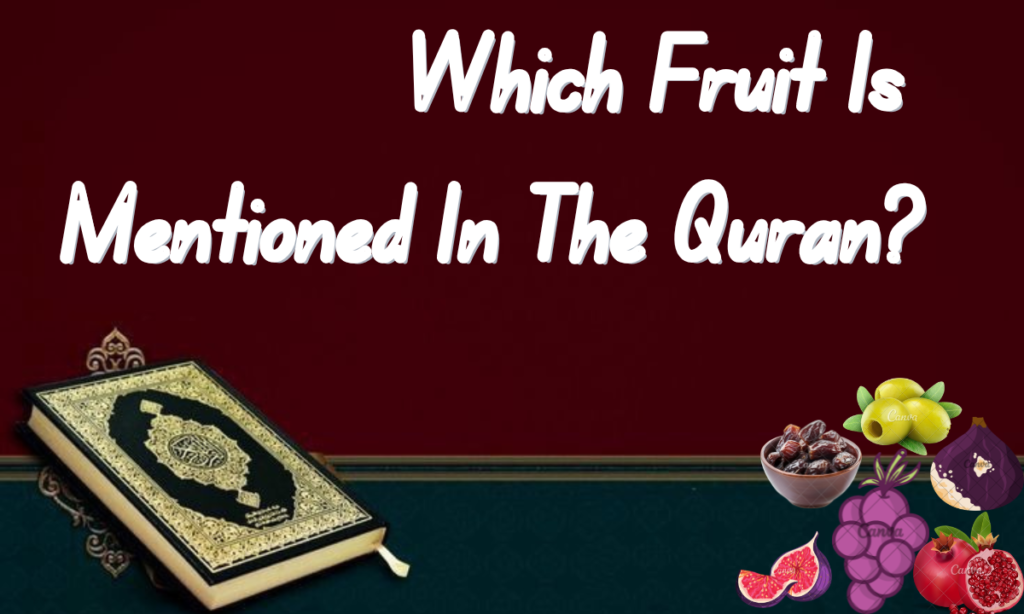Have you ever wondered about the fruits mentioned in the Quran and why they hold such importance? Fruits are special in Islam. They are signs of Allah’s creation. Fruits also remind us of paradise and Allah’s many blessings. The Quran talks about many fruits. These fruits are important for our spirit, culture, and health.

Fruits Mentioned in the Quran
Dates (Tamr)
Dates are very special in Islam and have a deep meaning. They are closely linked to the Prophet Muhammad (PBUH), who encouraged people to eat them because they are healthy and full of good energy. Dates are mentioned many times in the Quran, showing how important they are as food and a symbol of goodness. For example, in Surah Maryam, when Maryam (Mary) gave birth to Prophet Isa (Jesus, PBUH), she was told to eat fresh dates to help her regain strength. This shows how dates are tasty and good for our bodies and can help heal and nourish us. Dates are also significant during Ramadan, the holy month of fasting. People often eat dates to break their fast, following the example of the Prophet Muhammad (PBUH). Eating dates during Ramadan is a way to honor his traditions and to get the energy needed after a long day of fasting. Dates remind us of the importance of taking care of our bodies and following the teachings of Islam.
Grapes (Inab)
Grapes are a special fruit mentioned in the Quran. They are shown as a gift from Allah, something that brings many blessings and good things. In Surah Al-Mu’minun, Allah says He gave us gardens with date palms and vines. These plants grow many fruits, like grapes. The fruits show us what Allah gives us on Earth. They also remind us of the great rewards in paradise. Grapes are a sign of the good things in life, here and in the afterlife. They show how much Allah loves and cares for us.
Figs (Teen)
The fig is a very special fruit that is mentioned in the Quran in Surah At-Teen. In this verse, Allah swears by the fig and the olive, which shows how important these fruits are. Figs are not just delicious, but they are also good for our health. They are full of important nutrients that help keep our bodies strong and healthy. Because of this, figs have been an important part of Islamic history and traditions. Figs are also a symbol of prosperity, which means they represent good things, success, and the blessings that come from Allah’s creation. When we think about figs, we remember how Allah has given us many wonderful things in nature to help us live well and stay healthy. The fig reminds us of the care and wisdom of Allah in making such healthy foods for us.
Olives (Zaytoun)
Olives are a very special fruit that is mentioned many times in the Quran. They are seen as important and blessed. In Surah An-Nur, Allah calls the olive tree “blessed,” which means it is something very good and special. Olive oil is also praised in the Quran because it can help heal and give light, making it a special gift from Allah. Besides being mentioned in the Quran, olives are also very good for our health. They are an important part of a healthy diet, especially in Mediterranean and Islamic countries, where they are used in many foods. Olives and their oil are not just tasty, but they also help keep us strong and healthy, showing how Allah gave us things that are good for our bodies and souls.
Pomegranates (Rumman)
Pomegranates are a special fruit mentioned in the Quran, and they are said to be part of the fruits found in paradise or Jannah. In Surah Ar-Rahman, Allah talks about how there are many wonderful fruits, palm trees, and pomegranates in paradise. This shows how beautiful and tasty pomegranates are, and how special they are to Allah. Pomegranates are tasty and healthy. They have antioxidants that are good for our bodies. When we see pomegranates, we remember how carefully Allah created everything. Allah made everything with love and care, and pomegranates are one of His beautiful gifts.
Bananas (Talh)
Bananas are mentioned especially in the Quran in Surah Al-Waqiah. In this verse, Allah talks about “Talh,” which many people believe refers to banana trees. These banana trees are described as being part of the wonderful things in paradise, which is a place of peace, happiness, and comfort. The mention of banana trees in paradise shows that there will be many luxuries and things that make life easy for the good people who follow Allah’s path. This reminds us of the amazing rewards that await those who do good deeds in this life. Bananas and banana trees help us think about the good things Allah has planned for the righteous in paradise. They make us excited for the great blessings waiting for us.
Why Are Fruits Emphasized in the Quran?
Fruits are not just delicious and healthy, they also remind us of Allah’s kindness and creativity. When we eat fruits, we can think about how Allah has created so many different kinds of fruits for us to enjoy. These fruits help our bodies grow strong and healthy, but they also show how generous Allah is by giving us so many blessings. In the Quran, fruits are often described as part of the rewards for good people in paradise. The beautiful pictures of fruits in paradise encourage believers to be good and do the right things in life. When we think about how wonderful the fruits in paradise will be, it helps us remember to be kind, do good deeds, and follow Allah’s guidance. So, fruits are not just food for our body, they also inspire us to be better and try our best to earn the rewards of paradise.
Spiritual Lessons from Fruits in the Quran
When we think about the fruits mentioned in the Quran, it helps us feel thankful and aware of how many good things Allah has given us. Every fruit, whether it’s sweet like a grape or sour like a lemon, has its own special taste and health benefits. These fruits are a sign of how wise and clever Allah is because He created them perfectly for us. When we stop to appreciate these gifts, we remember how kind Allah is to us. This makes us feel closer to Allah and helps us be more thankful for everything He has provided. By thinking about the blessings of fruits, we learn to be grateful for all the good things in our lives and strengthen our connection to our Creator.
The Role of Fruits in Islamic Culture
Fruits are very important in Islamic traditions. The Prophet Muhammad (PBUH) often ate fruits like dates and melons, showing us how good and healthy they are. By eating fruits, the Prophet set a great example of living a healthy life, and we can follow this example by including fruits in our own diets. In Islamic culture, fruits are also a symbol of kindness and generosity. When people gather together for celebrations or special events, they often share fruits as a way to show hospitality and care for others. Sharing fruits with friends and family is a beautiful way to show love and kindness, just as the Prophet Muhammad (PBUH) taught. Fruits bring people together, making everyone feel happy and special.
Conclusion: Which Fruit Is Mentioned In The Quran?
The fruits mentioned in the Quran are more than just dietary staples—they’re symbols of Allah’s mercy, blessings, and the promise of paradise. When we think about these fruits, we remember to be thankful and take care of our health and spirit.
FAQs: Which Fruit Is Mentioned In The Quran?
Q1: What are the most frequently mentioned fruits in the Quran?
The Quran talks about dates, olives, and grapes a lot. These fruits are important in Islam.
Q2: Why are olives considered sacred in Islam?
A. Olives are described as “blessed” in the Quran, symbolizing purity, illumination, and divine creation.
Q3: Is there a specific fruit linked to the Prophet Muhammad (PBUH)?
A. The Prophet Muhammad (PBUH) loved dates. He ate them often and used them to break his fast.
Q4: Are there any fruits associated with paradise in the Quran?
A. Yes, fruits like pomegranates, bananas, and grapes are described as part of the bounties of paradise.
Q5: What lessons can Muslims derive from fruits mentioned in the Quran?
A. These fruits remind believers of Allah’s blessings, encourage gratitude, and promote a healthy lifestyle.


